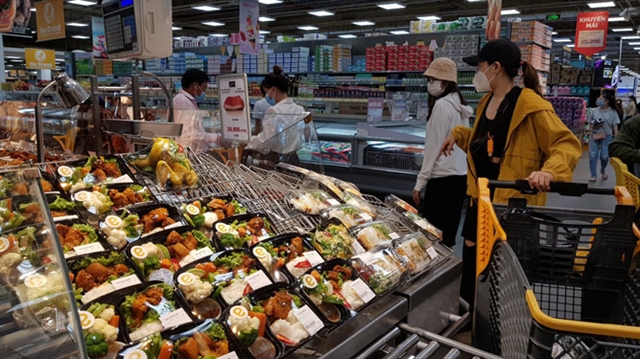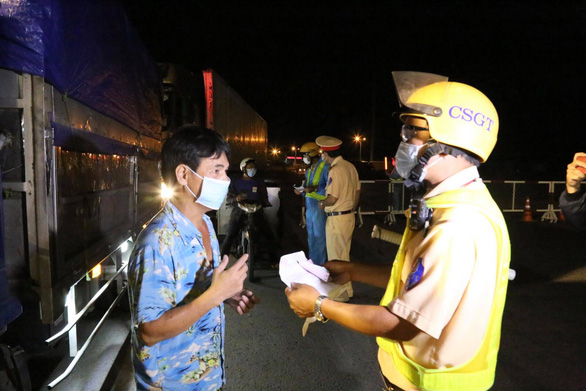 Society
Society


|
| Customers shopping inside a supermarket in HCM City. Supply and prices of essential goods are returning to normal following a rush by locals to stock up before the lockdown began on July 9. – Photo nld.com.vn |
HCM CITY – Supply of goods to HCM City’s markets and distributors are stabilising following a rush by locals in the last few days to stock up on goods, but the city is still facing some problems with goods shipments from other provinces.
An abundance of essential goods and produce such as vegetables and meat products are being supplied to markets. On Friday, nearly 2,800 tonnes of goods were supplied to traditional distribution channels, a 32 per cent increase from the day before.
Locals have stopped rushing to stock up on goods in large crowds, unlike the two days before the lockdown started.
Shopping demand at traditional markets dropped by more than half on Friday compared to Thursday, while shopping demand at supermarkets fell by 10 per cent. According to many retailers, shopping demand will continue to fall, then slowly return to normal over the next few days.
Trương Chí Thiện, director of Vĩnh Thành Đạt Foodstuff Joint Stock Company, said that people were rushing to stock up before lockdown so the company had to divert its products away from its online channels to focus on its main distribution channels. But now, demand has fallen, and the market will soon stabilise.
Prices of goods are also returning to normal, after the price hike a few days ago when locals were stocking up.
Businesses are increasing their production of essential goods to make up for their inventory shortage over the last few days.

|
| A driver's papers and COVID test results are checked at a HCM City – Long An Province border checkpoint. Businesses in HCM City are seeing problems with good shipments from other provinces, which is affecting their ability to restock quickly. – Photo tuoitre.vn |
Problems with shipments
Provinces have been making efforts to reduce delays for goods transport into or out of HCM City, and many businesses have said that around 80 per cent of their problems have been solved.
However, there are still some obstacles with goods shipments from other provinces that are related to COVID-19 regulations.
A representative of Organic Food told Người Lao Động (The Labourer) newspaper that its vegetable shipments from Long An and Lâm Đồng provinces were arriving late since they were stuck in Đồng Nai, which is carrying out a social distancing order under Directive 16.
The retail chain is working to supply orders that were made two to three days ago, and has had to stop taking orders from several delivery apps such as Grab and Tiki.
Nguyễn Ngọc An, general director of Vissan, said that some provinces were demanding that drivers have their COVID-19 test results done in the last 24 hours, as opposed to the usual 72 hours like other provinces.
Some inspection stalls have even demanded real-time polymerase chain reaction (RT-PCR) test results, instead of rapid tests.
This is affecting their delivery schedules.
Trương Chí Thiện said that his business was also facing problems with egg shipments from Tiền Giang (which accounts for half of the daily egg sales), since the province is demanding that drivers from HCM City have to have RT-PCR test results instead of rapid tests.
It can take up to 48 hours to receive RT-PCR test results, which can hamper business inventories in HCM City.
According to the Department of Transport, the HCM City – Long Thành – Dầu Giây Highway is suffering from occasional traffic congestion, partly caused by drivers turning around because they lacked the required papers.
The department is working with authorities to facilitate transport of essential goods, while the city is asking other provinces to co-operate in allowing vehicles transporting essential goods to pass through more easily.
Businesses have been issuing travel permits to their staff and reminding them to always bring their personal identifications and documents.
Chu Tiến Dũng, chairman of HCM City Union of Business Associations, said that all provinces should agree on one effective time frame for COVID-19 test results, and that demanding results of RT-PCR tests was too excessive.
Regions should also notify businesses before they carry out any new regulations, so that companies have the time to prepare and ensure smooth transportation of goods.
Two-thirds of markets closed
As of Friday, nearly two-thirds of HCM City’s traditional markets and all of its three wholesale markets have been closed due to COVID-19, according to the city’s Department of Industry and Trade.
As many as 94 convenience stores have also been closed.
Many markets and supermarkets have been using grocery cards, numbered tickets or shopping tickets that only allow households to shop on either even or odd days to limit the number of customers inside at a time, ensuring social distancing.
Nguyễn Nguyên Phương, deputy director of the department, said that the closing of so many traditional markets was affecting struggling residents who buy food daily and do not stock up on goods.
Districts are expected to work with closed markets to help them adhere to COVID-19 related regulations so they can re-open.
Meanwhile, markets that are soon to be closed have to work with the department and improve their conditions, if possible, to avoid being closed.
The districts have also been instructed to organise goods distribution events. As part of this initiative, suppliers transport their goods to different areas where local organisations and traders from closed markets help sell their goods to locals.
If districts want to close more traditional markets, they must find appropriate areas for suppliers to organise mobile selling trips so that locals can still buy essential goods easily.
HCM City is the number one COVID-19 hotspot in the country, with more than 11,400 cases as of Saturday afternoon. It has been under a social distancing order since May 31, and began a lockdown for 15 days starting on July 9 under Government Directive 16. – VNS